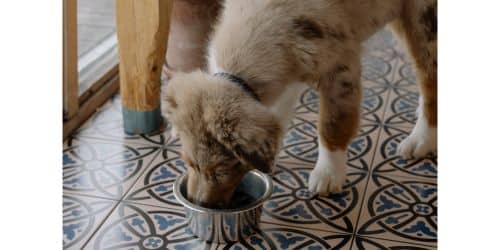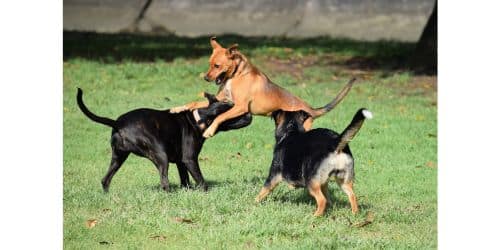When it comes to our canine companions’ nutritional demands, it’s natural to ask if they can safely consume some of the products humans do. “Can dogs eat baby food?” is a frequently asked question. Baby food appears to be a viable option for dogs, particularly those with sensitive stomachs or dental concerns, due to its soothing textures and easily digestible components. In this detailed article, we will look into whether dogs can eat baby food, as well as the potential benefits and concerns. So, let’s get started and figure out what’s best for our four-legged buddies!
Understanding Baby Food Ingredients
It’s critical to understand the substances usually present in baby food before deciding whether it’s safe for dogs to eat. Baby food is frequently made up of pureed fruits, vegetables, and meats. Fruits such as apples, pears, and bananas are popular, as are vegetables such as carrots, peas, and sweet potatoes. Furthermore, infant food may contain pureed meats such as chicken, turkey, or beef. These ingredients are typically cooked, blended, and strained to create a smooth consistency suitable for babies.
While many of these ingredients are generally acceptable for dogs, it is crucial to note that baby food frequently contains additives or flavors that are not suitable for dogs to eat. Some infant foods may contain trace levels of salt, sugar, or even onion and garlic powder, which can be toxic to dogs if consumed in large amounts. As a result, it’s critical to carefully read labels and select baby food options with few or no additional additives that can be harmful to your dog’s health.
Can Dogs Eat Baby Food?
Yes, dogs can eat baby food in moderation, but there are some key factors to consider. Baby food is frequently created from pureed fruits, veggies, and meats that are generally acceptable to feed to dogs. However, it is critical to select infant food options that are free of potentially dangerous additives, fillers, or spices.
When shopping for baby food for your dog, look for straightforward and uncomplicated versions that do not contain extra ingredients such as onion, garlic, excessive salt, sugar, or artificial flavors. In significant quantities, these compounds might be toxic to dogs. It is critical to carefully read the labels to guarantee the safety of the baby food you select.
It is crucial to remember that baby food should not be used in place of a well-balanced dog meal designed specifically for your dog’s nutritional needs. Baby food is not nutritionally balanced for dogs and should only be used as a treat or supplement on occasion. Relying only on baby food as your dog’s long-term diet can result in nutritional imbalances or inadequacies.
Always contact your veterinarian before introducing baby food into your dog’s diet. They may give you specialized advice based on your dog’s specific demands, health issues, and dietary preferences. They can advise you on whether baby food is a good supplement or alternative to your dog’s usual diet.
While dogs can eat baby food in moderation, it should not be the mainstay of their diet. Select plain kinds free of potentially dangerous ingredients, and always speak with your veterinarian to ensure your dog’s nutritional needs are satisfied.
The Pros and Cons of Feeding Baby Food to Dogs
Giving baby food to dogs has its own set of benefits and drawbacks. Let’s look at the benefits and drawbacks of feeding baby food to your dog.
Pros:
- Soft and Easily Digestible: Baby food is noted for its smooth texture, which makes it suitable for dogs with dental issues, older dogs, or those recovering from surgery or sickness. Baby food with a pureed consistency requires less chewing and is easier on their digestive processes.
- Nutritional Value: Baby food frequently comprises a mix of fruits, veggies, and meats, which provide critical nutrients for your dog’s overall health. Fruits and vegetables are high in vitamins, minerals, and antioxidants, whereas meats are high in protein. You can supplement your dog’s diet with nutritious baby food made from natural components.
- Variety: Baby food comes in a wide selection of flavors and combinations, allowing you to introduce new flavors to your dog’s palate. This is especially good for fussy eaters or dogs who require additional motivation to eat.
Cons:
- Lack of Balance: Baby food is designed for infants and is not nutritionally appropriate for dogs. While it may supply some nutrients, it is not intended to cover all of a dog’s nutritional needs. Relying only on baby food as a long-term diet for your dog can result in vitamin deficits or imbalances.
- Additives and Fillers: As previously stated, some baby food products may contain additives, fillers, or seasonings that are not good for dogs to eat. These additives may include salt, sugar, artificial flavors, or onion and garlic powder, which can be hazardous to dogs if consumed in high quantities.
- Limited Fiber Content: Baby food is often lacking in fiber, which is an important component of a dog’s diet for proper digestion. In dogs, a lack of fiber can cause constipation or gastrointestinal problems, especially if baby food becomes a large part of their daily diet.
Baby Food Safety Guidelines for Dogs
While baby food may offer some potential benefits for dogs, strict safety rules must be followed to ensure your dog’s safety. Here are some critical safety points to remember:
- Consult Your Veterinarian: Always consult with your veterinarian before introducing baby food into your dog’s diet. They may analyze your dog’s particular needs, health concerns, and nutritional requirements to see if baby food is a good complement or replacement for their regular diet.
- Select Plain and Basic: When shopping for baby food for your dog, go for plain and basic kinds with few or no extra ingredients. Look for products that just contain the essential components and no additives, fillers, or spices that could be hazardous to your dog’s health.
- Examine the Labels: Read the labels of baby food products carefully, looking for any components that may be dangerous to dogs. Baby food containing onions, garlic, excessive salt, sugar, or artificial tastes should be avoided.
- Moderation is Essential: Baby food should be used as a treat or supplement rather than a mainstay of your dog’s diet. It should not be used in place of a well-balanced dog food that fits their nutritional needs. Moderation is essential for avoiding problems.
Risks of Feeding Baby Food to Dogs
While baby food may appear to be a practical and perhaps helpful option for dogs, there are some risks to be aware of. Let’s look at some of the potential dangers of giving baby food to dogs to eat.
- Nutritional Imbalances: As previously stated, baby food is not designed to suit all of a dog’s specialized nutritional demands. While it may provide certain nutrients, relying only on baby food as a long-term diet might result in vitamin, mineral, and amino acid imbalances or deficiencies. To ensure your dog’s best health and well-being, provide a well-balanced meal that is specifically created for dogs.
- High Caloric Density: Baby food, especially those containing fruits or sweeteners, can have more calories than standard dog food. Excessive feeding of baby food can contribute to weight gain and obesity in dogs. To keep your dog at a healthy weight, you must examine the calorie content and modify the portion size accordingly.
- Dental Issues: While the soft texture of baby food may benefit dogs with dental issues, feeding only soft foods might contribute to poor dental health. Chewing on dry kibble aids in the removal of plaque and tartar from a dog’s teeth. There is an increased risk of dental disorders such as gum disease and tooth decay if there is insufficient chewing. If infant food is given, extra oral health initiatives, such as regular tooth cleaning or providing appropriate dental chews or toys, must be implemented.
Alternative Options for Dogs
Aside from baby food, there are other alternatives to consider if you’re seeking safe and healthy options to supplement or enrich your dog’s diet. Here are a few recommendations:
- Fresh Fruits and Veggies: Instead of using baby food, you can give your dog fresh fruits and veggies as healthy treats or as supplements to his normal meals. Carrots, green beans, blueberries, and watermelon are among the dog-friendly foods. However, it is critical to do research to verify that the fruits and vegetables you purchase are safe for dogs and that any harmful types should be avoided.
- Homemade Dog Food: If you want to provide your dog with a more tailored and nutritional diet, consider making homemade dog food from veterinarian-approved recipes. This gives you complete control over the ingredients and portion sizes, resulting in a balanced and personalized diet for your pet.
- Commercial Dog Treats: On the market, various commercially available dog treats are specifically developed to fulfill the nutritional needs of dogs. These treats can come in a range of tastes and textures, making them a safe and practical way to reward and supplement your dog’s diet.
What types of baby food are safe for dogs?
When it comes to dog-safe baby food, it’s critical to find products that are free of dangerous substances and additives. The following varieties of baby food are typically regarded as safe for dogs:
- Plain Fruit Baby Food: Pureed fruits such as apples, pears, and bananas can be used to make dog food.
- Plain Vegetable Baby Food: Pureed vegetables such as carrots, peas, and sweet potatoes can be used to make dog food.
- Combination Blends: Some infant food products have fruit, vegetable, and meat mixtures. When selecting these blends, make sure they contain just natural components and no dangerous additives or flavors.
- Plain Meat Baby Food: Pureed meat baby food such as chicken, turkey, or beef can be a source of protein for dogs.
Always choose plain and uncomplicated types for your dog’s baby food, free of extra salt, sugar, artificial flavors, or excessive seasonings. It’s critical to carefully study the labels and select choices with few or no extra substances that could be harmful to your dog’s health.
How much baby food should I give my dog?
The amount of baby food you should feed your dogs to eat is determined by various factors, including their size, age, overall health, and nutritional requirements. It’s crucial to note that baby food should never be used in place of a well-balanced dog meal designed specifically for your dog’s nutritional needs. Baby food should be given as a treat or supplement rather than as a mainstay of their diet.
When giving baby food to your dog, start with little portions and see how they accept it. Keep an eye on their digestion as well as any signs of pain or unpleasant reactions. You can progressively increase the amount of size if your dog enjoys the baby food and has no bad reactions.
As a general rule, start with a small teaspoon or two of baby food as a treat or mix it into their regular dog food to add taste. If your dog tolerates it well, you can increase the amount to a few teaspoons, but keep it to no more than 10% of their daily caloric intake.
Can dogs eat baby corn?
In moderation, dogs can eat baby sweetcorn. They should never be fed to your dog raw, since they pose a choking hazard. Before feeding it to your dog, make sure you cook it first and chop it into little manageable pieces.
Can dogs eat cornflakes?
As long as they are only consumed in small amounts and are fed quality dog food for their main meals, dogs can eat cornflakes without any problems.
Can dogs eat bread?
The answer is yes. Dogs can eat bread safely in moderation, as long as it’s fully baked and does not contain hazardous substances such as raisins, garlic, seeds, or chocolate. Unfortunately, it will not give them any nutritional benefits, so we do not recommend giving it to your dog.
Conclusion
While baby food may appear to be a realistic alternative for dogs, it is critical to proceed with caution and weigh the potential risks and benefits. Baby food can be used as a treat or to supplement your dog’s regular diet on occasion, but it should not be used in place of a well-balanced dog food that is specifically created for their nutritional needs.
When selecting baby food for your dog, choose pure and simple kinds free of additives, fillers, and flavors that might be threatening to their health. Read the labels carefully and avoid products that contain onion, garlic, excessive salt, sugar, or artificial flavors.
Before introducing baby food or making any significant modifications to your dog’s diet, contact your veterinarian. They may give you specialized advice based on your dog’s specific demands, health issues, and dietary preferences.
Finally, your pet’s well-being should be your main priority, and giving them a nutritionally balanced and adequate diet is critical for their long-term health and enjoyment.
Related Articles
- 21 Worst Dog Food Brands To Avoid In 2023
- 20 Best Large Breed Puppy Food In 2023: Reviews and Comparisons
- Best High Fiber Dog Food Brands In 2023
- Best Hydrolyzed Protein Dog Food: 2023 Reviews
- Can Dogs Eat Cooked Shrimp Shells and Tails?
- Why Is My Dog Shaking When He Breathes In?
- Is Stevia Safe for Dogs?






